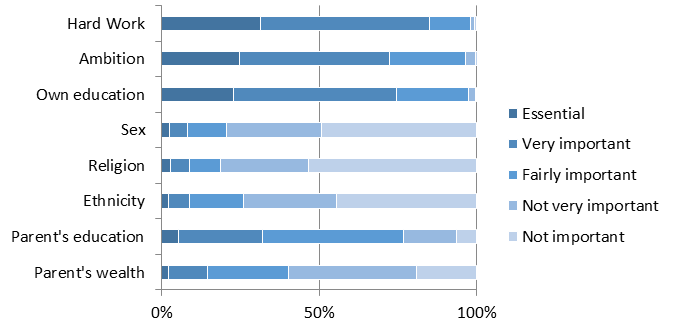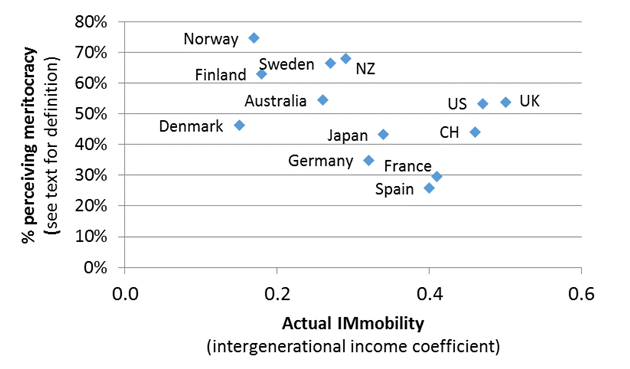How meritocratic do Britons think their country is? The question of perceptions has been relatively understudied but is nonetheless important. Declan Gaffney and Ben Baumberg find that while people overwhelmingly agree that children from richer families have more opportunities, they also believe that family wealth is a relatively minor factor in determining outcomes. Factors like hard work and ambition are seen as much more important.
The importance of social mobility has long been accepted across the political spectrum – even before Thomas Piketty’s pessimistic account reached the bestseller lists. Yet somehow, in a world where we are increasingly opinion-polled-to-death, relatively little has been written about what British people think about social mobility. To accompany a new TUC pamphlet on social mobility released tomorrow (at this event) that looks at the true picture of social mobility, this blog post provides an insight into the perceptions that coexist with these realities.
Do we think Britain is a socially mobile country?
Perceptions of social mobility are characterised by a strange paradox. On the one hand, most of us think that Britain is not completely fair. Considerable majorities of people agree that ‘Children from better off families have many more opportunities than children from less well-off families’ (82% agree vs. 7% disagree), or that ‘many people are disadvantaged because of their background, and have to work much harder than others of equal basic talent to overcome the obstacles they face’ (55% agree vs. 22% disagree). [A quick word on data sources: the last result is from a YouGov survey for the Fabian Society in Bamfield and Horton 2009 (p24); other results in the chapter are from British Social Attitudes Survey (BSAS) 2009 unless specified].
Yet at the same time, people think these are relatively minor factors in determining where you end up in life. As shown in the Figure below, for ‘getting ahead in life’, meritocratic factors (like hard work and ambition) are seen as much more important than non-meritocratic factors (like coming from a wealthy family).
Figure 1: Importance of different factors for ‘getting ahead in life’ (British Social Attitudes 2009)
It seems that we don’t think we have completely equal opportunities – but we still think that opportunities are equal enough to count as a meritocracy. So for example, the Fabian Society survey found that most people agreed that ‘Opportunities are not equal in Britain today, but there is enough opportunity for virtually everyone to get on in life if they really want to. It comes down to the individual and how much you are motivated’ (69% agree, 14% disagree). In the words of Elizabeth Anderson, the public believes that “what is important is not that everyone has equal opportunities to acquire resources and fulfilling jobs, but that everyone has ‘enough’” of an opportunity.
Do we think that Britain has become more or less mobile?
There is a longstanding dispute among British researchers about whether social mobility has stayed static or declined, which we review in the accompanying pamphlet. Our interest here, however, is whether people think that social mobility has gone down. There are surprisingly few studies of this (Heath et al in British Social Attitudes instead consider a different question: whether the perceptions of meritocracy (as above) have changed 1987-2009). However, research by Ipsos MORI for the Sutton Trust (2009 and 2008) does ask people whether they think that ‘opportunities for social mobility in Britain NOW are higher, about the same or lower than they were in the past?’
The answers are striking: 34% of people in 2008 think that opportunities are greater now than in the past, compared to only 19% who think they are lower. Interpreting questions like this is tricky, partly because ‘the past’ is an imprecise period, and partly because people often confuse absolute and relative social mobility (concepts that we distinguish in our pamphlet). So when people later said that the recession was limiting opportunities for social mobility, this may mean that people expect their children to be worse off in future, rather than society becoming more unfair. Still, the (limited) evidence suggests that politicians’ rhetoric of declining social mobility has not resonated with the majority of the public.
Do more mobile countries know they are?
A final question is whether countries with high actual levels of mobility have higher perceived mobility. To look at this, we have put together data on actual social mobility (from Miles Corak) with perceptions of meritocracy from the International Social Survey Programme (ISSP), shown in the Figure below. We consider people as ‘perceiving meritocracy’ if they think that two meritocratic factors (hard work and ambition) are both more important for ‘getting ahead’ than two non-meritocratic factors (well-educated parents and a wealthy family).
Figure 2: Actual social immobility compared with perceptions of meritocracy
Overall we find that perceptions do follow reality: countries that are more immobile (towards the right) are less likely to perceive that they are meritocratic (towards the top). We must be slightly cautious about reading too much into this, given differences of culture and language that affect people’s responses to survey questions. Still, it seems that Britain is a country with relatively low social mobility among comparable countries, yet with a middling to high belief that we are meritocratic (whether we use this measure/survey or others).
In conclusion, then, people’s perceptions are relatively positive: they think that Britain is meritocratic (background is seen to matter, but much less than ability or ambition), that social mobility has been rising, and are more likely to think they live in a meritocracy than many comparable countries – even though most other comparable countries are more mobile in practice. In the accompanying TUC pamphlet, we look further at why Britain does not have higher social mobility, and what can be done to change this.
Note: This article gives the views of the authors, and not the position of the British Politics and Policy blog, nor of the London School of Economics. Please read our comments policy before posting. Homepage image credit: Zeitfaenger.at
About the Authors
Declan Gaffney has worked in public policy and research since 1997, as an academic, as advisor to regional and national government and as a freelance policy consultant. He has written and published extensively on child poverty, public finance, social security and labour markets.”
Ben Baumberg is a Lecturer in Sociology and Social Policy at the University of Kent. He is Co-Director of the Kent Q-Step Centre for the innovative teaching of quantitative social science, and co-founder of the collaborative research blog Inequalities (http://inequalitiesblog.wordpress.com). You can find out more about his research/teaching at www.benbaumberg.com”










Interesting piece, however, I would not be convinced given the methodological inadequacies. Although, I would be inclined to question what impact the equality of opportunity rhetoric and ‘blame culture’ pushed forward by the media and politicians has had on these people’s perceptions. Institutional and structural barriers alongside judgemental attitudes that exist, prohibit social mobility at a number of levels. You only need to look at postgraduate funding (or indeed lack of it). Furthermore, the act of becoming socially mobile involves much more than climbing the occupational ranks and increased wealth, more attention should be given to Durkheim’s theory on social mobility.